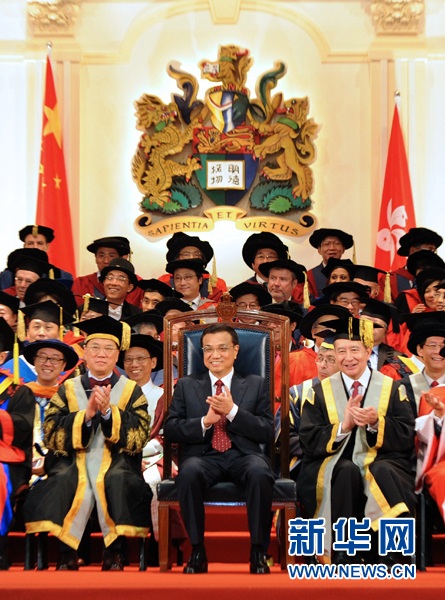
China's Li = HKU's President?
February 7, 2012
The 818 incident at the University of Hong Kong (HKU) has aroused widespread concern since the question involved is whether the University was sacrificing its core values such as university autonomy and freedom of expression to ingratiate itself with the rich and the powerful. Unfortunately, the review panel established by the University has failed to come up with a report that dispels public concern.
The review report has to deal with two issues. First, a whole host of police officers descended on the university campus, and the police pushed student protesters into a stairwell, thus depriving them of the right as well as the freedom of demonstration. Second, the seating arrangement for the ceremony, both on and below the stage, was such that it gave the widespread impression that the University was trying to ingratiate itself with the rich and the powerful.
As regards the first issue, the report criticises the police for using "unnecessary and unjustifiable force" and expresses regret over it. It would seem from this that the University does not approve of the police's use of force. However, Police Commissioner Andy Tsang Wai-hung declared that, in accordance with an agreement with HKU management, the police had only used "a minimum level of force". HKU has let this pass without any comment, which means either that there are two different versions of the story or, to put it more seriously, that the University also played a part in preventing students from making their voices heard by Vice Premier Li Keqiang. The report has failed to give a clear answer to a technical question as simple as this.
And in the Loke Yew Hall, where the University's Centenary Ceremony was held, the seating arrangement on and below the stage smacked of obsequiousness to the rich and the powerful. On the stage, Li was seated in the centre and in the "Centenary Chair", commanding everyone's attention, while Lord David Wilson, another Guest of Honour and former Governor of Hong Kong, was seated on one side in the second row. It would be difficult to make people believe that such a seating arrangement was not designed to do honour to Li by humiliating the former governor.

China's Li = HKU's President?
As for the seats below the stage, most of them were reserved for donors to the University, the majority of whom were business magnates. All this gave the impression that the University was ingratiating itself with the politically powerful on the stage, and the economically powerful below the stage. It is said that the University held its Centenary Ceremony to highlight its academic achievements and traditions, but what was seen at the ceremony was a far cry from this stated aim. While HKU's 100-year history is studded with names of the great and near great, the University has failed to avail itself of the opportunity to focus public attention on its splendid educational achievements and contributions to society, which is highly regrettable.
The review report concludes that there is no evidence of any attempt by the University to ingratiate itself with the rich and the powerful. But the suppression of student demonstrations outside the ceremony hall and the seating arrangement for the ceremony were clearly deliberate efforts made to please the powerful and the rich. We cannot see a more reasonable conclusion than this. It must be pointed out that obsequiousness is something whose existence simply cannot be proved in the same way as one can objectively and indisputably prove things in a criminal case. After all, no university administrator will ever admit to obsequiousness to the rich and the powerful.
HKU's report on the 818 incident has failed to clear the name of the University.